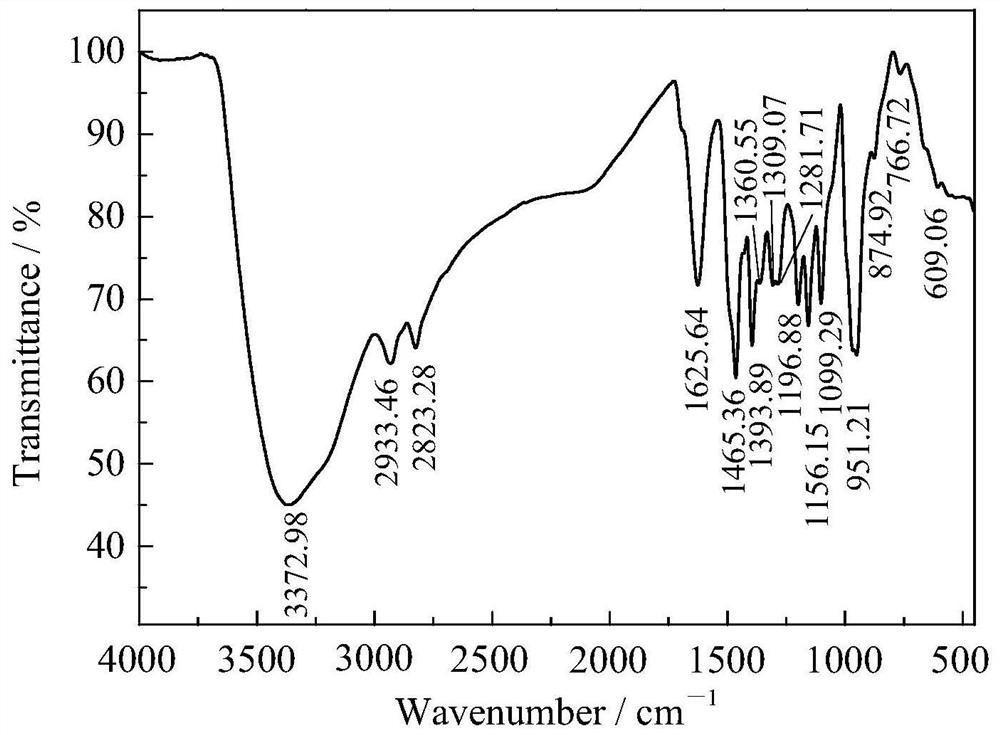A kind of copolymerized polymer chelating flocculant and preparation method thereof
A polymer and flocculant technology, applied in chemical instruments and methods, flocculation/sedimentation water/sewage treatment, water pollutants, etc., can solve the problems of slow sedimentation, weak chelation ability, small flocs, etc., and achieve less pollution , Enhanced chelating ability, thicker flocs
- Summary
- Abstract
- Description
- Claims
- Application Information
AI Technical Summary
Problems solved by technology
Method used
Image
Examples
Embodiment 1
[0027] (1) Get the piperazine 2.16g that mass fraction is 99.5% and join in the three-necked bottle of 250mL band mechanical stirring, reflux condenser and dropping funnel, then add 108.0g dehydrated alcohol, after fully dissolving, add mass fraction is 5.9 mL of 95.0% triethylenetetramine, then heated up to 60°C, slowly added 2.97 mL of epichlorohydrin with a mass fraction of 99.0% dropwise within 30 minutes, and continued the reaction for 3 hours after the addition;
[0028] (2) The reaction mixture obtained in step (1) was rotary-evaporated at 60°C and -0.095MPa until no more solvent dripped out to obtain 10.37g of light yellow sticky substance; collected 96.3g of ethanol;
[0029] (3) Transfer the viscous matter obtained in step (2) into a 500mL three-necked bottle with mechanical stirring, reflux condenser and dropping funnel, add 207.4g of distilled water, stir to dissolve, and then add 6.875g with a mass fraction of 96.0% After dissolving, slowly add 9.18 mL of carbon d...
Embodiment 2
[0033](1) Take 2.16g of piperazine with a mass fraction of 99.5% and add it to a 250mL three-necked bottle with mechanical stirring, reflux condenser and dropping funnel, then add the 96.3g ethanol collected in Example 1, after fully dissolving, add 7.1mL of triethylenetetramine with a mass fraction of 95.0%, then raised the temperature to 65°C, slowly added 3.56mL of epichlorohydrin with a mass fraction of 99.0% dropwise within 35min, and continued the reaction for 2.5h after the addition;
[0034] (2) The reaction mixture obtained in step (1) was rotary-evaporated at 60°C and -0.095MPa until no more solvent dripped out to obtain 10.49g of light yellow viscous substance; 86.9g of ethanol was collected;
[0035] (3) Transfer the viscous matter obtained in step (2) into a 500mL three-necked bottle with mechanical stirring, reflux condenser and dropping funnel, add 262.3g of distilled water, stir to dissolve, and then add 8.625g of 96.0% mass fraction After dissolving, slowly ad...
Embodiment 3
[0037] (1) Take 2.16g of piperazine with a mass fraction of 99.5% and add it to a 250mL three-necked bottle with mechanical stirring, reflux condenser and dropping funnel, then add the 86.4g ethanol collected in Example 2, after fully dissolving, add 7.87mL of triethylenetetramine with a mass fraction of 95.0% was then heated up to 60°C, and 3.96mL of epichlorohydrin with a mass fraction of 99.0% was slowly added dropwise within 35min, and the reaction was continued for 2h after the addition;
[0038] (2) The reaction mixture obtained in step (1) was rotary-evaporated at 60°C and -0.095MPa until no more solvent dripped out to obtain 10.84g of light yellow sticky substance; collected 75.9g of ethanol;
[0039] (3) Transfer the viscous matter obtained in step (2) into a 500mL three-necked bottle with mechanical stirring, reflux condenser and dropping funnel, add 325.2g of distilled water, stir and dissolve, then add 10.83g of 96.0% mass fraction After dissolving sodium hydroxide...
PUM
 Login to View More
Login to View More Abstract
Description
Claims
Application Information
 Login to View More
Login to View More - R&D
- Intellectual Property
- Life Sciences
- Materials
- Tech Scout
- Unparalleled Data Quality
- Higher Quality Content
- 60% Fewer Hallucinations
Browse by: Latest US Patents, China's latest patents, Technical Efficacy Thesaurus, Application Domain, Technology Topic, Popular Technical Reports.
© 2025 PatSnap. All rights reserved.Legal|Privacy policy|Modern Slavery Act Transparency Statement|Sitemap|About US| Contact US: help@patsnap.com



